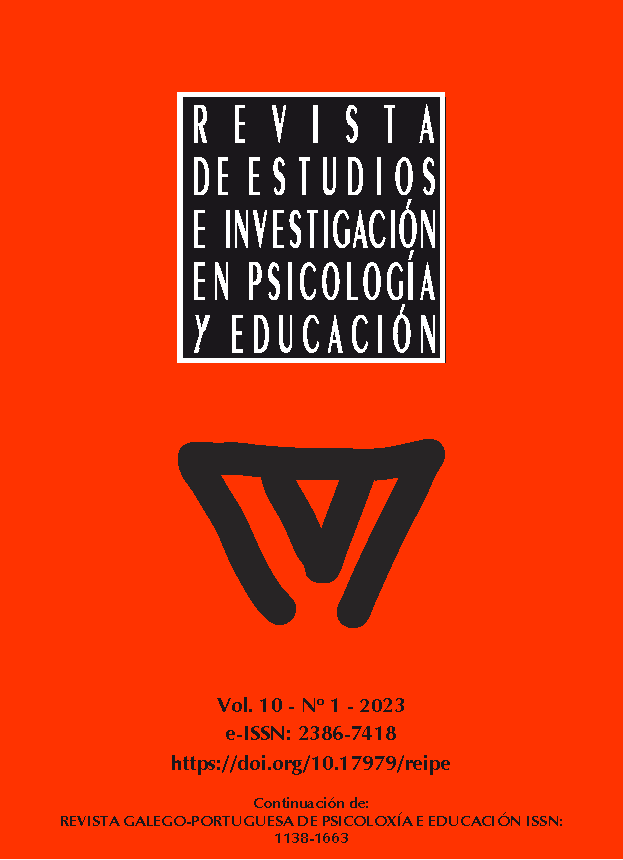Time management: What do University students think about it?
DOI:
https://doi.org/10.17979/reipe.2023.10.1.9468Keywords:
time management, academic achievement, mental health, ; college students, higher educationAbstract
Time management practices allow users to meet their needs and pursue their goals within set deadlines. At university, time management is an important factor in promoting academic adaptation and good mental health. This article is based on a time management workshop for higher education students conducted over two years. A total of 17 students from public (n = 14) and private (n = 3) universities participated in the workshop, with a mean age of 28.4 years (SD = 15.3), of whom 14 were women. A Descending Hierarchical Classification (CHD) was employed using the software Iramuteq to analyze the participants’ conceptions about different time management strategies (both previously adopted and newly acquired), the difficulties involved in using them, and the lack of opportunities to implement them. The results revealed difficulties in relation to meeting deadlines for academic tasks, avoiding distractions, procrastination and maintaining study-life balance. The findings highlight the importance of providing students with spaces to accommodate their time management needs during their time at university.
Downloads
Publication Facts
Reviewer profiles N/A
Author statements
Indexed in
-
—
- Academic society
- N/A
- Publisher
- Universidade da Coruña, Servizo de Publicacións
References
ADAMS, Richelle V., & BLAIR, Erik (2019). Impact of time management behaviors on undergraduate engineering students’ performance. SAGE Open, 9(1), 1-11. https://doi.org/10.1177/2158244018824506
ALLEN, David (2015). Getting things done: The art of sress-free productivity (Revised edition). Penguin Books.
ARAÚJO, Alexandra M., SANTOS, Acácia Angeli dos, NORONHA, Ana Paula, ZANON, Cristian, FERREIRA, Joaquim A., CASANOVA, Joana R., & ALMEIDA, Leandro S. (2016). Dificuldades antecipadas de adaptação ao ensino superior: um estudo com alunos do primeiro ano. Revista de Estudios e Investigación en Psicología y Educación, 3(2), 102-111. https://doi.org/10.17979/reipe.2016.3.2.1846
CAMARGO, Brigido Vizeu, & JUSTO, Ana Maria (2018). Tutorial para uso do software IRAMUTEQ. Available from: http://www.iramuteq.org/documentation
ESTRADA, Rolando Juan Soliz, FLORES, Gilberto Tim, & SCHIMITH, Cristiano Descovi (2011). Gestão do tempo como apoio ao planejamento estratégico pessoal. Revista de Administração da Universidade Federal de Santa Maria, 4(2), 315-332. https://doi.org/10.5902/198346593349
LEAHY, Robert. L., TIRCH, Dennis, & NAPOLITANO, Lisa A. (2013). Emotion regulation in psychotherapy: A practitioner's Guide. Artmed.
MARCILIO, Fabiane Cristina Pereira, BLANDO, Alessandra, ROCHA, Roberta Zanini da, & DIAS, Ana Cristina Garcia (2021). Guia de técnicas para a gestão do tempo de estudos: Relato de construção. Psicologia: Ciência e Profissão, 41, 1-13. https://doi.org/10.1590/1982-3703003218325
MCCANN, Carolyn, FOGARTY, Gerard J., & ROBERTS, Richard D. (2012). Strategies for success in vocational education: Time management is more important for part-time than full-time students. Learning and Individual Differences, 22(2), 618-623. https://doi.org/10.1016/j.lindif.2011.09.015
NAYAK, Shalini G. (2019). Impact of procrastination and time management on academic stress among undergraduate nursing students: A cross sectional study. International Journal of Caring Sciences, 12(3), 1480-1486. Available from: http://www.internationaljournalofcaringsciences.org/Issue.aspx?issueID=53&pageIndex=4&pageReason=1
NOGUEIRA-MARTINS, Luiz Antonio, & NOGUEIRA-MARTINS, Maria Cezira Fantini (2018). Saúde mental e qualidade de vida de estudantes universitários. Revista Psicologia, Diversidade e Saúde, 7(3), 334-337. https://doi.org/10.17267/2317-3394rpds.v7i3.2086
RIBEIRO, Rejane, SOARES, Adriana Benevides, JARDIM, Maria Eduarda de Melo, ALVES, Paulo Roberto Soares da Silva, & MEDEIROS, Cesar Augusto Cobellas de (2021, Outubro 05-08). A gestão do tempo na rotina universitária: resultados de uma intervenção [Comunicação Oral]. I Congresso Brasileiro de Atenção à Saúde Mental nas Universidades, On-line. Available from : https://www.youtube.com/watch?v=TGv5oy_Fg9c&list=PLVqZnaXtMl8JrurPecbIoXXRMlGIzVD1Z&index=1&t=1s&ab_channel=CASMEUNI2021
SOARES, Adriana Benevides, MELLO, Thatiana Valory dos Santos, & BALDEZ, Monique de Oiveira Moura (2011). Vivências acadêmicas em estudantes universitários do Estado do Rio de Janeiro. Interação em Psicologia, 15(1), 59-69. https://doi.org/10.5380/psi.v15i1.16049
SOARES, Adriana Benevides, MONTEIRO, Marcia Cristina, MEDEIROS, Humberto Claudio Passeri, MAIA, Fatima de Almeida, & BARROS, Roberta de Souza Nogueira (2021). Adaptação acadêmica à universidade: relações entre motivação, expectativas e habilidades sociais. Psicologia Escolar e Educacional, 25, 1-8 https://doi.org/10.1590/2175-35392021226072
TRENTEPOHL, Sebastian, WALDEYEr, Julia, FLEISCHER, Jens, ROELLE, Julian, LEUTNER, Detlev, & WIRTH, Joachim (2022). How did it get so late so soon? The effects of time management knowledge and practice on students’ time management skills and academic performance. Sustainability, 14(9), 5097. https://doi.org/10.3390/su14095097
UMERENKOVA, Angélica Garzon, & FLORES, Javier Gil (2018). Gestión del tiempo en alumnado universitario con diferentes niveles de rendimiento académico. Educação e Pesquisa, 44, 1-16. https://doi.org/10.1590/S1678-4634201708157900
WOLTERS, Cristopher A., & BRADY, Anna C. (2020). College students’ time management: A self-regulated learning perspective. Educational Psychology Review, 33, 1319–1351. https://doi.org/10.1007/s10648-020-09519-z
Downloads
Published
How to Cite
Issue
Section
License
The papers published in this journal are licensed under a Creative Commons Attribution-ShareAlike 4.0 International License.
Authors are the holders of the exploitation rights (copyright) of their work, but grant the right of first publication to the Revista de Estudios e Investigación en Psicología y Educación, which may publish in any language and format as well as publish and distribute their whole or partial content by any technologically available means and via data base.
Authors are allowed and encouraged to disseminate the articles accepted for publication on personal or institutional websites, before and after their publication, provided it is clearly stated that the work is in this journal and all bibliographic data are provided along with access to the document, preferably through the DOI (if it is indispensable to use a pdf, the final version formatted by the journal should be used). In the case of articles resulting from funded studies or projects, this will be done within the deadlines and terms established by the supporting organisation(s) of the published research.




